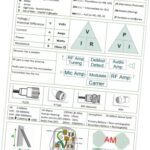Some handy advice when studying for, and taking, your Foundation amateur radio exam:
Hints & Tips Video
We’ve created a video covering some of the more important hints and tips:
Exam preparation
- Make sure you have studied all of the material – this could be via an online course, at a radio club, from the training manual, or from YouTube
- Don’t wait too long between studying, and taking the exam (as you’ll forget stuff)
- Take some mock tests – you shouldn’t even think about booking your exam until you can regularly get 19/26 or better on mock tests. Be warned – some online mock websites have not been updated to the current syllabus!
- Spend some time getting familiar with the 4-page exam booklet – what table does what, and how to look things up.
Day of the exam
 Take a couple of mock tests (from a site offering current mocks – like this one)
Take a couple of mock tests (from a site offering current mocks – like this one)- Have a quick review of the areas where you know you’re weak
- Review the key areas: Formula Triangles, Block Diagrams, Callsigns and Regional Locators – our handy Foundation Revision Sheet might be of use here
- Watch the HamTrain Quick Revision Video
- If you’re using your computer to take the exam, make sure it’s had all of the operating system and anti-virus updates – as you don’t want your computer to be slowed down or interrupted for “updates” during the exam
Just before the exam
- Make sure you have everything ready and are comfy. You’re allowed a drink during your exam (we suggest non-alcoholic!)
- Make sure you have your 4-page exam booklet, a pen, some blank paper and a calculator. No other notes allowed
- Relax! The exam isn’t life or death – if you don’t pass first time, who cares? You can always take it again when you’re more prepared
During the Exam
The exam time is one hour, which is plenty of time. Many people finish earlier, but don’t be rushed. We recommend you spend at least one minute per question. Here is what you need to do with each question:
- Read each question carefully
- Read through every single answer – don’t just pick the first one that “sounds sort of right”
- Work out which answers are definitely wrong
- Select the answer that is MOST right, not the first one that looks right
- Use the exam booklet every time a frequency is mentioned, to check what the rules are for that frequency
Remember, take your time and don’t panic.
Also, don’t forget that 4-page exam booklet. Here’s what it tells you:
- Parameters – What frequencies can you use at Foundation, with what restrictions
- Band Plans – How the 2m (144-146MHz) and 20m (14.0-14.35MHz) bands are divided up
- Conversion chart – Convert between frequency and wavelength
- Frequency Allocation Table – Frequencies used by other radio services
- Gain Table – Calculate the e.r.p using the dB Conversion Table
At the end of the exam, go through all of the questions and answers again, asking yourself “am I sure this is the best answer?”
After the Exam
If you thought one or more of the questions were unfair, tell the exam invigilator – there is a mechanism for reporting (challenging) problem questions which may be unfair (badly-worded, confusing, using jargon, or just plain trick questions).
Take a note of any such question (either the wording, or the question reference number), and report any such question to the Invigilator after the exam. Also, tell your tutor.
Related Links
- Foundation Online – Free Internet-based distance learning course
- Foundation Exam Information – Details on taking the Amateur Radio Foundation Exam
- Exam Support – Need help help and support? Help is available
- Foundation Study Guide and Foundation Training Manual – Two publications to help with study for Foundation
- RSGB Examination Guidelines
- RAIBC – Helping those with disabilities to get into amateur radio
Good luck with your studies and exams. Any tips we’ve missed? Share them below!


